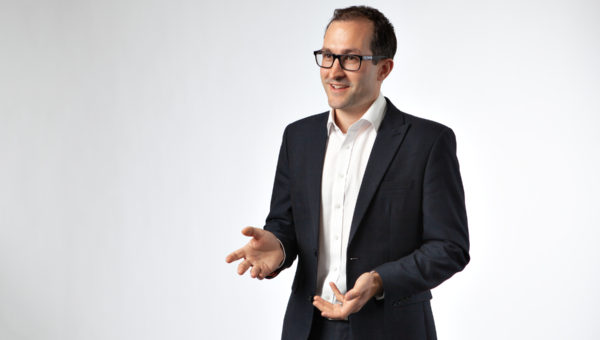The view from here – Richard Stubbs, CEO of the Yorkshire & Humber AHSN

In this series we ask key spokespeople from across the region and from our core sectors to share their insights.
This time we speak to Richard Stubbs, CEO of the Yorkshire & Humber Academic Health Science Network (AHSN) about the new traction for innovation across the NHS, his passion for driving diversity in healthcare and his mission for our region to be the UK’s epicentre for life sciences.
How has the COVID 19 pandemic impacted innovation in healthcare?
The crisis has precipitated rapid transformation in the NHS and social care at a time of immense challenge.
We’ve been working with many innovators to support the NHS with this challenge, including Healthy.io who are turning the smartphone into a medical device, used for diagnostic tests at home. Nexus member business Scaled Insights is combining AI and psychology to provide vital analysis of patient behaviour in the face of the pandemic.
Acceleration of new ideas and ways of working has been phenomenal, particularly around telephone and online appointments and hospital procedures.
The question now is how to sustain that acceleration of new ideas and maintain traction for innovation in health and social care, so that it becomes business as usual.
You’re the national AHSN lead on NHS Reset (the NHS Confederation’s drive to shape the future of the service) what do you think needs to happen to maintain the pace of change?
We (the NHS) have got to be a better customer. The past six months has helped the NHS to be less inward-looking and to see business innovators as allies and partners – we need to build on that progress and ensure that every single consideration about implementing a new product or service doesn’t produce 350 different answers from our individual NHS providers.
Businesses also need to be better suppliers. The NHS doesn’t have the mechanisms in place to cascade tech and innovations down, as say a John Lewis or Tesco would. There are literally hundreds of autonomous companies in the NHS – it’s an ecosystem, not a single organisation.
The AHSN helps companies to think longer and harder about the needs of the NHS. It’s not simply about a good business proposition. Innovators need to ask themselves who is going to buy it, where is the customer and what is the benefit. They also need to address what implementation skills might be needed around the innovation and ask: can the purchaser disinvest from the old way of working without major cost implications?
Working with clinicians, patients and market access experts early on is critical – this is always a co-production.
Health Service Journal has just named you one of the most influential BAME leaders in health – what changes do you most want to influence?
I hope I can inspire others to push boundaries and increase diversity within the health innovation sector. Almost 20% of NHS staff are from Black, Asian and Minority Ethnic backgrounds – it’s essential that the innovation pipeline benefits all staff, otherwise you are shutting the door on a fifth of the workforce.
We must support and empower diverse innovators – they bring lived experience and knowledge about engaging with diverse communities and tackling health inequality. They can help to ensure more inclusive programmes, services and patient experience.
Where do you see our region specifically within the UK health innovation sector?
It’s a real privilege to be CEO for the AHSN in Yorkshire & Humber – we have more life sciences companies here than the whole of Oxford and Cambridge combined.
We’re already a powerhouse of innovation – what we need now is greater Government recognition of that.
But we must speak with one, cohesive voice. It’s not about rival universities or rival cities. We’re all each other’s champions. We have synergistic assets in all our sub-regions – working together, we can create more, high-value jobs and attract more inward investment across the whole of Yorkshire & Humber.
Industry innovators can also help by being ambassadors for our region, as well as their own company.
What should businesses do to be a part of the future health and social care world?
Regardless of what the world looks like post-pandemic, there has been a major shift in people’s perspective on health. We’ve seen, very clearly, how the NHS can pick you up when you fall over, but, as citizens we’re also now much more aware of our own accountability and responsibility when it comes to our health.
Whether that’s directly, in relation to social distancing and hygiene, or indirectly, in terms of obesity awareness, for example – something the Prime Minister has put centre stage – there is a much clearer link between health and personal responsibility.
For businesses, that presents a much more aware and engaged consumer-led market. Data analytics, AI, smartphone technology and wearable apps will all have a role to play in helping to improve our physical and mental health.
Entrepreneurs and business innovators should take a look at the work we’re publishing, particularly through the AHSN Network’s Innovation Exchange, which will help them to connect to the help they need, not only in our region, but sharing best practice nationally through the 15 AHSNs across the UK.
We believe in the power of new ideas to improve lives and create a thriving economy for everyone – partnerships across the health and care community, industry, academic researchers and national organisations, will be key to that success.
Explore more insights from our ‘the view from here’ series:
Latest news

The view from here – Jem Henderson, Tech Nation
We catch up with Jem Henderson, Yorkshire Entrepreneur Engagement Manager with Tech Nation, over a virtual coffee to chat about what's happening at Tech Nation and what she sees as the main opportunities for tech businesses across our region.
Read article
The view from here – Nick Williams, Leeds University Business School
We catch up with Nick over a virtual coffee and chat about the role he thinks entrepreneurs will play in the post-COVID recovery and what makes Leeds such a great place to start and scale a business.
Read article
The view from here – Andy Camenisch, Partner, HGF
We take a virtual coffee break with Andy Camenisch and talk about this thoughts on agile working, regional economic revival and what innovation-led businesses should be doing right now.
Read article
The view from here – Eve Roodhouse, Leeds City Council
We caught up with Eve, Chief Officer, Culture and Economy at Leeds City Council, about the challenges and opportunities ahead for our region’s economy.
Read article